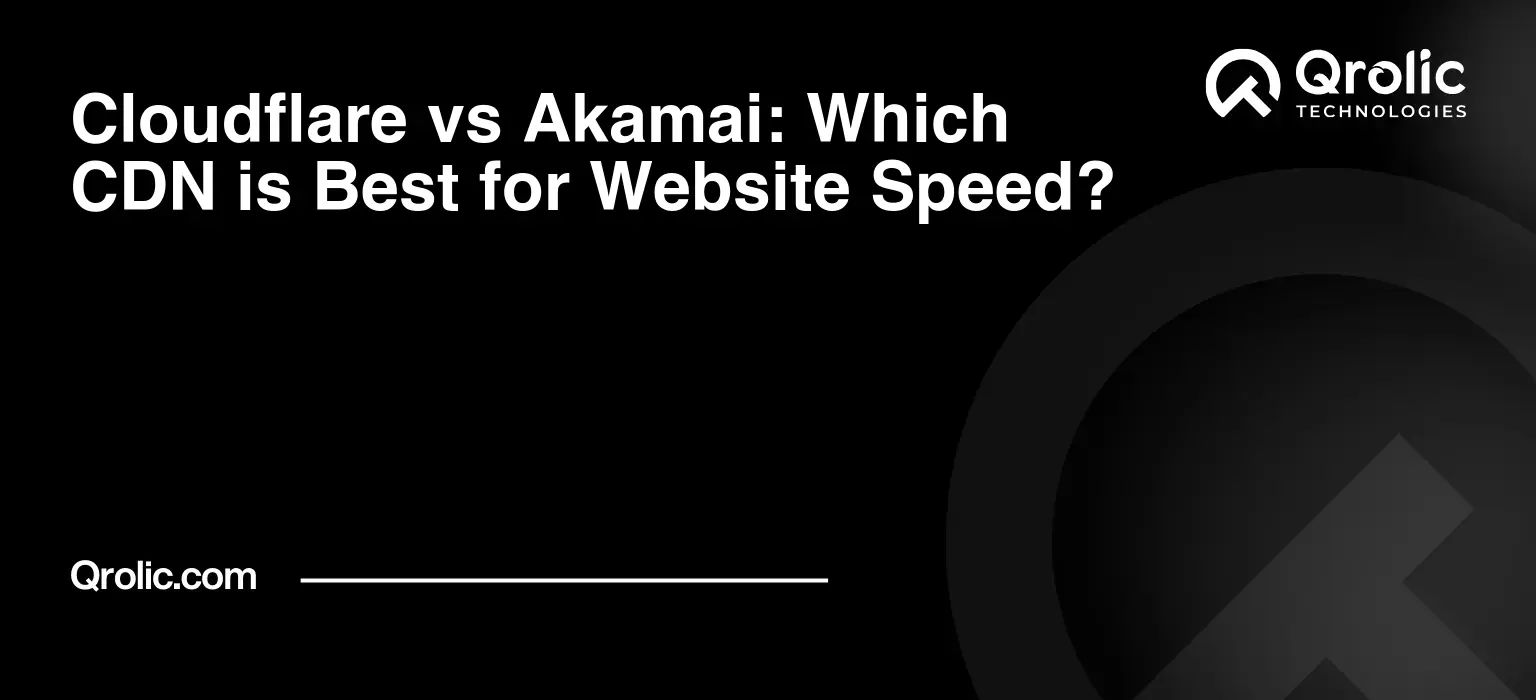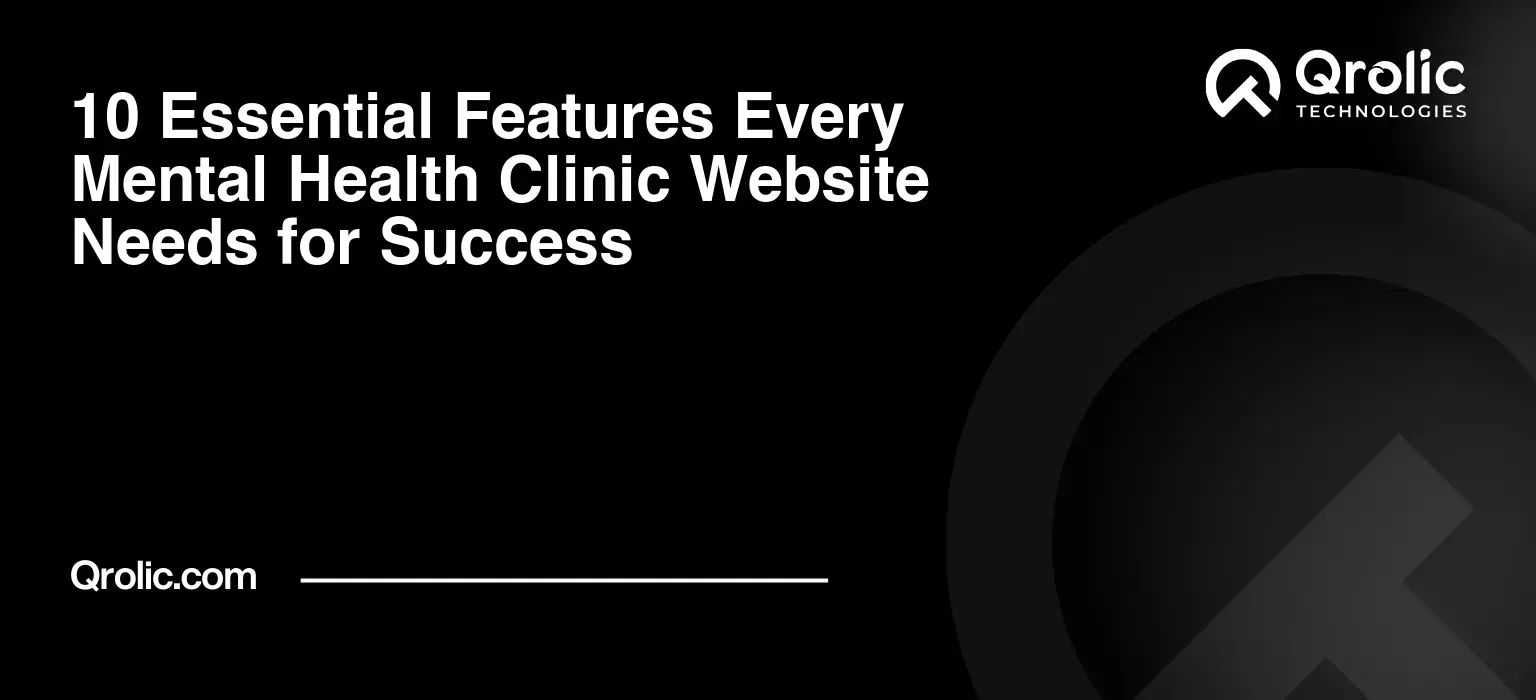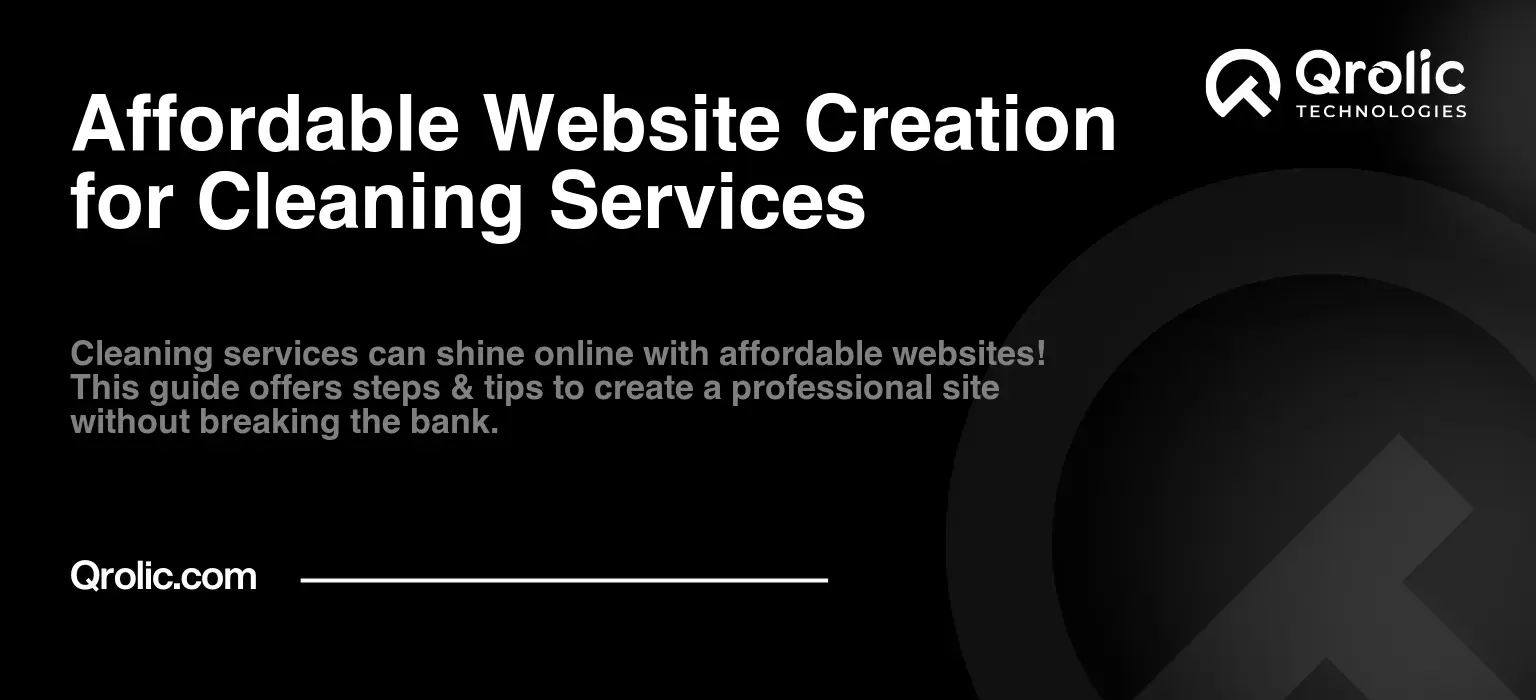Website speed is no longer just a perk; it’s a necessity. A slow-loading website can frustrate visitors, increase bounce rates, and ultimately, hurt your bottom line. That’s where Content Delivery Networks (CDNs) come in, acting as turbo boosters for your website’s performance. Among the titans in the CDN arena, Cloudflare and Akamai stand out. But which one reigns supreme when it comes to optimizing website speed? This comprehensive guide delves deep into a Cloudflare vs Akamai showdown, analyzing their features, performance, pricing, and more, to help you choose the best CDN for your specific needs.
Quick Summary:
- CDNs dramatically speed up websites by delivering content faster.
- Cloudflare offers easy, affordable speed; Akamai is for large businesses.
- Choose your CDN based on budget, features, and website size.
- Website speed optimization is an ongoing journey, not a one-time fix.
Table of Contents
- Understanding the Need for a CDN: Why Speed Matters
- The Problem: Latency and Distance
- The Solution: Content Delivery Networks (CDNs)
- Benefits of Using a CDN for Website Speed Optimization:
- Cloudflare: Democratizing Website Performance and Security
- Cloudflare Key Features:
- Cloudflare Benefits:
- Cloudflare Use Cases:
- Akamai: The Enterprise-Grade CDN Powerhouse
- Akamai Key Features:
- Akamai Benefits:
- Akamai Use Cases:
- Cloudflare vs Akamai: A Detailed Comparison
- 1. Performance:
- 2. Security:
- 3. Pricing:
- 4. Ease of Use:
- 5. Customer Support:
- 6. Customization:
- 7. Scalability:
- 8. Geographic Reach:
- Cloudflare vs Akamai: Side-by-Side Table
- Making the Right Choice: Which CDN is Best for You?
- Qrolic Technologies: Your Partner in Website Optimization
- Beyond Cloudflare vs Akamai: Other CDN Considerations
- Final Thoughts: Website Speed is a Journey, Not a Destination
Understanding the Need for a CDN: Why Speed Matters
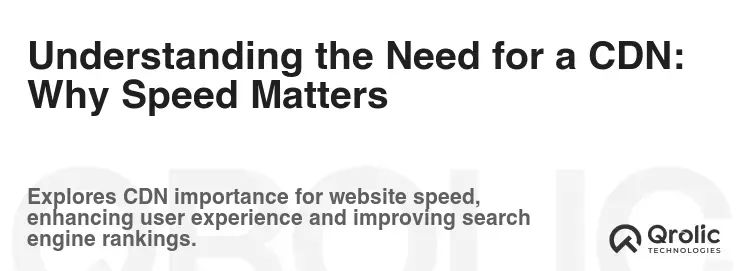
Before we dive into the Cloudflare vs Akamai comparison, let’s establish why CDNs are crucial for website speed optimization.
The Problem: Latency and Distance
Imagine your website’s server is located in New York. A visitor from London accessing your site has to wait for data to travel across the Atlantic. This distance introduces latency, the delay between a request and a response. Latency significantly impacts page load times, creating a frustrating user experience.
The Solution: Content Delivery Networks (CDNs)
CDNs solve this problem by strategically distributing your website’s content across multiple servers located around the globe. These servers, called Points of Presence (PoPs), cache your website’s static content (images, videos, CSS, JavaScript) closer to your users.
Here’s how it works:
- A user from London requests a page from your website.
- The CDN redirects the request to the nearest PoP in London.
- The PoP delivers the cached content directly to the user.
This dramatically reduces latency, resulting in faster page load times and a smoother user experience.
Benefits of Using a CDN for Website Speed Optimization:
- Reduced Latency: Delivers content from servers closer to users, minimizing delays.
- Improved Page Load Times: Faster loading leads to better user engagement and lower bounce rates.
- Reduced Server Load: Offloads traffic from your origin server, preventing overload and ensuring stability.
- Increased Bandwidth: CDN providers have robust infrastructure to handle large traffic spikes.
- Enhanced SEO: Google considers website speed a ranking factor, so faster loading times can improve your search engine visibility.
- Improved User Experience: A fast and responsive website keeps visitors engaged and encourages conversions.
- Global Reach: Allows you to serve content efficiently to users worldwide.
- Cost-Effective: Can reduce bandwidth costs and server resource consumption.
Cloudflare: Democratizing Website Performance and Security
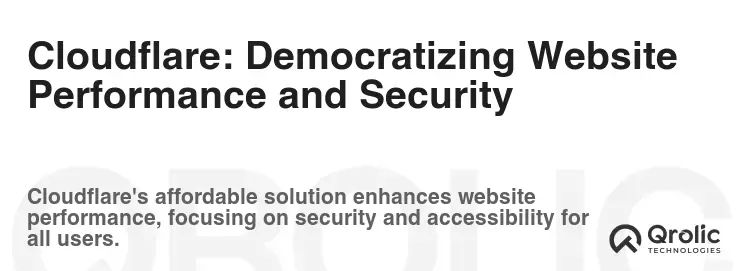
Cloudflare has emerged as a popular CDN provider, particularly known for its free plan and ease of use. It positions itself as a comprehensive solution for website performance and security, offering a wide range of features.
Cloudflare Key Features:
- Global Network: A vast network of PoPs strategically located across the globe. As of 2024, Cloudflare boasts a network of over 300 PoPs, giving it incredible reach.
- Free Plan: A generous free plan that includes basic CDN functionality, DDoS protection, and SSL certificate. This makes Cloudflare a very attractive option for smaller websites and blogs.
- DDoS Protection: Robust DDoS mitigation capabilities to protect your website from malicious attacks. Cloudflare employs techniques like rate limiting, IP reputation analysis, and challenge pages to defend against various DDoS attack vectors.
- Web Application Firewall (WAF): A WAF to protect your website from common web vulnerabilities like SQL injection and cross-site scripting (XSS).
- SSL Certificates: Free SSL certificates to encrypt traffic between your website and visitors, ensuring secure communication.
- Caching: Intelligent caching mechanisms to store static content and deliver it quickly. Cloudflare supports various caching policies, including browser caching, edge caching, and tiered caching.
- Image Optimization: Automatic image optimization features to reduce image file sizes without sacrificing quality.
- Cloudflare Workers: A serverless computing platform that allows you to run code on Cloudflare’s edge network. This enables you to customize your CDN behavior and build dynamic applications.
- DNS Management: Free and reliable DNS management services.
- Load Balancing: Distributes traffic across multiple servers to prevent overload and ensure high availability (available in paid plans).
- Content Optimization: Automatic minification of HTML, CSS, and JavaScript files to reduce file sizes.
- Analytics: Real-time analytics to monitor your website’s performance and traffic.
Cloudflare Benefits:
- Easy to Use: Simple and intuitive interface, making it easy to set up and manage.
- Affordable: Offers a free plan and competitive pricing for paid plans.
- Comprehensive Security: Provides robust security features to protect your website from attacks.
- Global Performance: Delivers content quickly to users worldwide.
- Rich Feature Set: Offers a wide range of features beyond basic CDN functionality.
- Developer-Friendly: Provides APIs and tools for developers to customize and extend the platform.
Cloudflare Use Cases:
- Small Businesses and Blogs: The free plan is ideal for smaller websites and blogs looking for basic CDN functionality and security.
- Websites with Global Audiences: The vast global network ensures fast content delivery to users worldwide.
- Websites Requiring DDoS Protection: Robust DDoS mitigation capabilities protect against malicious attacks.
- Websites Looking for a Comprehensive Solution: Offers a wide range of features beyond basic CDN functionality, including WAF, SSL certificates, and image optimization.
- Developers Building Edge Applications: Cloudflare Workers provides a platform for running code on the edge network.
Ready to Build Your Next Project?
Let’s turn your ideas into a powerful digital solution. Contact us today to get started with expert web development and design services.
Akamai: The Enterprise-Grade CDN Powerhouse
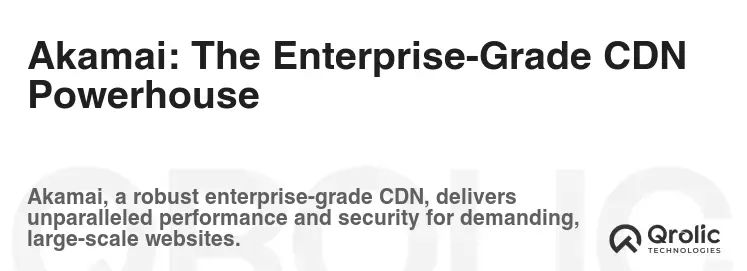
Akamai is a pioneer in the CDN industry, known for its enterprise-grade performance, reliability, and security. It caters to large businesses and organizations with demanding performance requirements.
Akamai Key Features:
- Massive Global Network: One of the largest and most established CDN networks in the world. Akamai boasts a network of over 350,000 servers in more than 130 countries, offering unmatched global reach.
- Advanced Caching: Sophisticated caching algorithms and techniques to optimize content delivery. Akamai uses techniques like object caching, dynamic content acceleration, and adaptive media delivery to ensure optimal performance.
- Security Solutions: Comprehensive security solutions, including DDoS protection, WAF, and bot management. Akamai’s security solutions are highly regarded in the industry and are used by many large enterprises.
- Dynamic Content Acceleration: Technologies to accelerate the delivery of dynamic content, such as personalized web pages and e-commerce transactions.
- Adaptive Media Delivery: Optimized delivery of streaming video and audio content.
- Image and Video Optimization: Advanced image and video optimization features to reduce file sizes and improve performance.
- API Integration: Robust APIs for integrating Akamai with other systems and applications.
- Real-Time Monitoring and Analytics: Comprehensive real-time monitoring and analytics to track performance and identify issues.
- Cloud Security: Features to protect against web application attacks, DDoS attacks, and bot traffic.
Akamai Benefits:
- Unmatched Performance: Delivers content with exceptional speed and reliability.
- Enterprise-Grade Security: Provides robust security solutions to protect against sophisticated attacks.
- Scalability: Can handle massive traffic spikes and ensure high availability.
- Customization: Highly customizable to meet the specific needs of large organizations.
- Advanced Features: Offers a wide range of advanced features for optimizing content delivery and security.
- Reliable Support: Provides dedicated support and expertise to help customers manage their CDN.
Akamai Use Cases:
- Large Enterprises: Ideal for large organizations with demanding performance and security requirements.
- E-commerce Websites: Accelerates website speed and improves the user experience for online shoppers.
- Media and Entertainment Companies: Optimizes the delivery of streaming video and audio content.
- Gaming Companies: Provides low-latency content delivery for online games.
- Financial Institutions: Ensures secure and reliable delivery of financial data and transactions.
Cloudflare vs Akamai: A Detailed Comparison
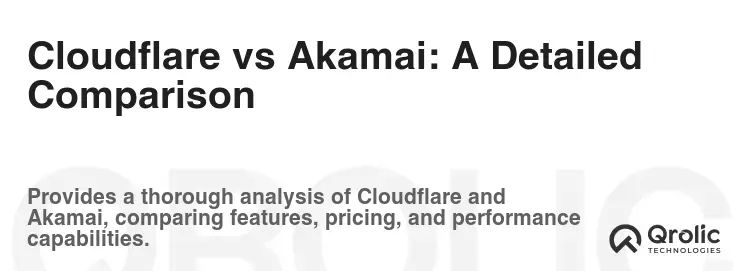
Now, let’s delve into a detailed comparison of Cloudflare vs Akamai across various aspects to help you make an informed decision.
1. Performance:
- Cloudflare: Offers excellent performance, especially for static content. Its vast network and caching capabilities contribute to faster page load times for users worldwide. Cloudflare’s Argo Smart Routing feature further optimizes performance by intelligently routing traffic across its network.
- Akamai: Known for its exceptional performance and reliability, especially for dynamic content and complex web applications. Its advanced caching algorithms and dynamic content acceleration technologies ensure optimal performance even under heavy load. Akamai consistently ranks among the top CDN providers in performance benchmarks.
Winner: Akamai generally edges out Cloudflare in terms of raw performance, especially for complex and dynamic content. However, Cloudflare’s performance is still excellent and more than sufficient for most websites.
2. Security:
- Cloudflare: Provides robust security features, including DDoS protection, WAF, and bot management. Its global network acts as a shield against attacks, protecting your website from malicious traffic. Cloudflare’s security features are constantly evolving to address emerging threats.
- Akamai: Offers enterprise-grade security solutions that are highly regarded in the industry. Its security features include DDoS protection, WAF, bot management, and API protection. Akamai’s security solutions are designed to protect against the most sophisticated attacks.
Winner: Akamai has a slight edge in security due to its more advanced and comprehensive security solutions. However, Cloudflare’s security features are also very strong and provide excellent protection for most websites.
3. Pricing:
- Cloudflare: Offers a free plan with basic CDN functionality, making it an attractive option for smaller websites and blogs. Its paid plans are also competitively priced, making it a cost-effective solution for businesses of all sizes. Cloudflare’s pricing is transparent and predictable.
- Akamai: Typically more expensive than Cloudflare, especially for smaller businesses. Its pricing is often based on usage and can be complex to understand. Akamai’s pricing is geared towards large enterprises with demanding performance and security requirements.
Winner: Cloudflare is the clear winner in terms of pricing, offering a free plan and more affordable paid plans.
4. Ease of Use:
- Cloudflare: Known for its simple and intuitive interface, making it easy to set up and manage. Its user-friendly dashboard allows you to quickly configure settings and monitor performance. Cloudflare’s ease of use is a major advantage for users who are not technical experts.
- Akamai: Can be more complex to set up and manage, especially for users who are not familiar with CDN technology. Its interface is more geared towards technical users and may require more configuration and customization.
Winner: Cloudflare is much easier to use than Akamai, making it a better choice for users who are not technical experts.
5. Customer Support:
- Cloudflare: Offers a variety of support options, including a knowledge base, community forum, and email support. However, phone support is only available for Enterprise customers.
- Akamai: Provides dedicated support and expertise to help customers manage their CDN. Its support options include phone support, email support, and online documentation.
Winner: Akamai generally offers better customer support, especially for its enterprise customers.
6. Customization:
- Cloudflare: Offers some customization options through Cloudflare Workers, allowing you to run code on its edge network.
- Akamai: Highly customizable to meet the specific needs of large organizations. Its advanced features and APIs allow for extensive customization and integration with other systems.
Winner: Akamai offers significantly more customization options than Cloudflare.
7. Scalability:
- Cloudflare: Highly scalable and can handle large traffic spikes. Its vast global network ensures high availability and performance even under heavy load.
- Akamai: Also highly scalable and designed to handle massive traffic spikes. Its robust infrastructure and advanced caching algorithms ensure optimal performance even during peak demand.
Winner: Both Cloudflare and Akamai are highly scalable and can handle large traffic spikes.
8. Geographic Reach:
- Cloudflare: Boasts a network of over 300 PoPs strategically located across the globe.
- Akamai: Has one of the largest CDN networks in the world, with over 350,000 servers in more than 130 countries.
Winner: Akamai has a slightly larger geographic reach than Cloudflare.
Cloudflare vs Akamai: Side-by-Side Table
| Feature | Cloudflare | Akamai |
|---|---|---|
| Performance | Excellent, especially for static content | Exceptional, especially for dynamic content |
| Security | Robust security features | Enterprise-grade security solutions |
| Pricing | Free plan and affordable paid plans | More expensive, usage-based pricing |
| Ease of Use | Simple and intuitive interface | More complex, geared towards technical users |
| Customer Support | Knowledge base, community forum, email support | Dedicated support and expertise |
| Customization | Limited customization options | Highly customizable |
| Scalability | Highly scalable | Highly scalable |
| Geographic Reach | Over 300 PoPs | Over 350,000 servers in 130+ countries |
Ready to Build Your Next Project?
Let’s turn your ideas into a powerful digital solution. Contact us today to get started with expert web development and design services.
Making the Right Choice: Which CDN is Best for You?
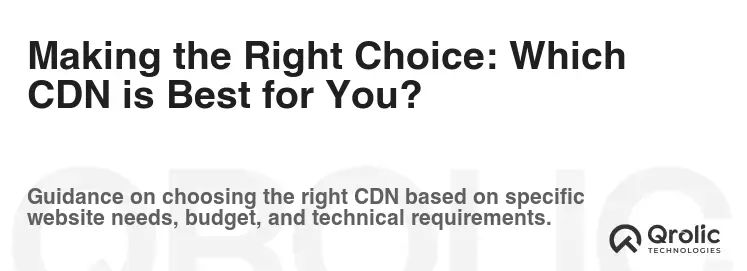
The “best” CDN depends on your specific needs and budget. Here’s a breakdown to help you decide:
Choose Cloudflare if:
- You are a small business or blog looking for a free or affordable CDN solution.
- You need a simple and easy-to-use CDN.
- You require robust DDoS protection and security features.
- You want a comprehensive solution with a wide range of features.
- You need a CDN with a global network for fast content delivery.
Choose Akamai if:
- You are a large enterprise with demanding performance and security requirements.
- You need exceptional performance for dynamic content and complex web applications.
- You require enterprise-grade security solutions to protect against sophisticated attacks.
- You need a highly customizable CDN that can be tailored to your specific needs.
- You require dedicated support and expertise to manage your CDN.
In essence:
- Cloudflare: Great for startups, small to medium-sized businesses, and personal projects seeking a balance of performance, security, and affordability.
- Akamai: Ideal for large enterprises, e-commerce giants, and organizations requiring the highest levels of performance, security, and customization.
Qrolic Technologies: Your Partner in Website Optimization
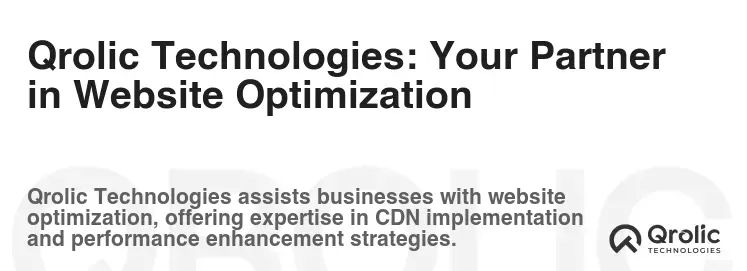
At Qrolic Technologies (https://qrolic.com/), we understand the importance of website speed optimization. We offer a comprehensive suite of services to help you improve your website’s performance, security, and user experience. Our expert team can help you:
- Analyze your website’s performance: Identify bottlenecks and areas for improvement.
- Implement a CDN: Choose the right CDN for your needs and configure it for optimal performance.
- Optimize your website’s code and images: Reduce file sizes and improve loading times.
- Enhance your website’s security: Protect against attacks and ensure data privacy.
- Monitor your website’s performance: Track key metrics and identify potential issues.
We have extensive experience working with both Cloudflare and Akamai, and we can help you choose the best CDN solution for your specific requirements. Contact us today to learn more about how we can help you optimize your website and achieve your business goals. We can help you seamlessly integrate these CDN solution in your current web infrastucture, we can handle all the technical aspects, so you can focus more on your business.
Beyond Cloudflare vs Akamai: Other CDN Considerations
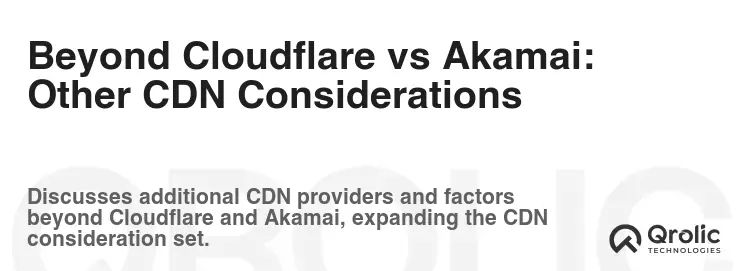
While Cloudflare and Akamai are prominent players, other CDN providers offer compelling solutions. Some alternatives include:
- Amazon CloudFront: A scalable and cost-effective CDN offered by Amazon Web Services.
- Google Cloud CDN: Integrated with Google Cloud Platform and offers advanced caching and security features.
- Fastly: A modern CDN known for its real-time configuration and developer-friendly features.
- KeyCDN: A budget-friendly CDN with a focus on performance and reliability.
When evaluating CDN providers, consider factors such as:
- Pricing: Understand the pricing model and potential costs.
- Performance: Evaluate the CDN’s speed and reliability.
- Features: Consider the features offered, such as security, caching, and customization.
- Support: Assess the quality and availability of customer support.
- Integration: Ensure the CDN integrates seamlessly with your existing infrastructure.
Final Thoughts: Website Speed is a Journey, Not a Destination
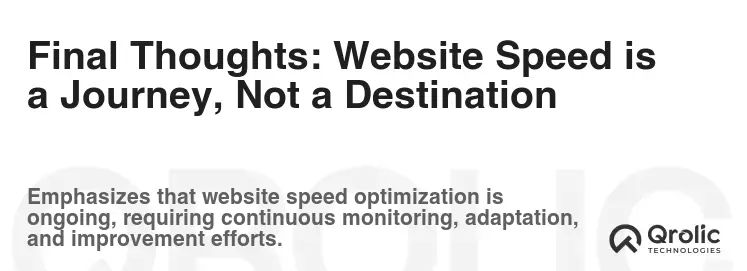
Choosing the right CDN is a crucial step in optimizing your website’s speed. While Cloudflare and Akamai are both excellent options, the best choice depends on your specific needs and budget. Remember to consider factors such as performance, security, pricing, ease of use, and customer support when making your decision.
Website speed optimization is an ongoing process. Regularly monitor your website’s performance, analyze your traffic, and adjust your CDN settings as needed to ensure optimal results. A fast and responsive website is essential for attracting and retaining customers, improving your search engine rankings, and achieving your business goals. Choose wisely, and let your website soar! Remember to run tests before and after CDN implementation to see the real impact.
